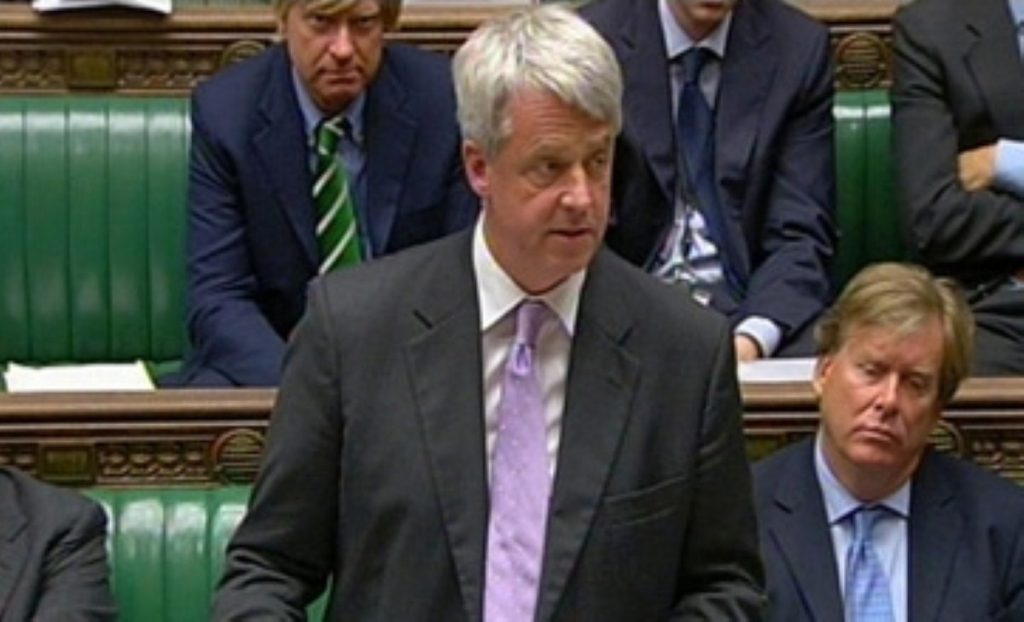Lansley faces cries of ‘humiliation’ as he tries to sell NHS reform
Andrew Lansley has been met with cries of "humiliation" in the Commons as he tried to announce the package of changes the government was implementing to his NHS reforms.
The health secretary struggled to inform the Chamber that the government would accept the core of yesterday's NHS Future Forum recommendations, with Labour MPs loudly mocking him during the statement.
"Humiliating," shadow health secretary John Healey concluded.


"The health secretary has had health policy taken out his hands.
"The report yesterday was a demolition job. This is a political fix, not a proper plan to improve care for patients."
He added: "What was a very bad bill will still be a very bad bill."
Mr Lansley was also attacked for only informing the Commons of the government's decision after he had conducted a heavily publicised press conference next to Nick Clegg and David Cameron at Guys Hospital, London.
During the event, Mr Clegg was keen to insist that the changes made to bill would not only restrict private involvement in the health service in the short term but also ruled out any future privatisation.
"You told us you were worried about privatisation through the back door so we've made that impossible," he told an audience of journalists and health professionals.
Mr Lansley, who has struck a defeated figure recently as his bill was publicly torn apart, insisted that "choice and competition" would still feature in the NHS.
It will now rely on pre-existing competition panels rather than being embedded in its day-to-day operations via the enforcement guidelines of new watchdog Monitor, however.
Unions warned that European competition law could still give private firms considerable leverage in the new-look NHS.
Unite's national officer for health, Rachael Maskell said: "Monitor will be promoting choice, competition and collaboration – all of which are contradictory aims.
"At present, the private healthcare firms have a toehold of about five per cent of the NHS – but these companies and their slick lawyers will use EU law to gain a headlock on the NHS."
Unison general secretary Dave Prentis added: "The government is creating a monster and the NHS is the victim.
"The bill will pave the way for private companies to grab any part of the NHS where they think they can turn a profit. Once the NHS is opened up to competition, it becomes subject to European competition laws and there is no turning back."
Yesterday the NHS Future Forum, consisting of leading experts from the health sector, issued 16 recommendations on how to amend the health and social care bill after a two-month 'listening pause'.
Professor Steve Field called for the legal duty on regulator Monitor to promote competition to be dropped altogether, the pace of change to be slowed down and for accountability to be improved by expanding the role of the national board.
Their report also called for the health secretary to have ultimate responsibility for the NHS – a provision not previously included in the bill.
It will now go back to committee stage, where MPs will scrutinise the legislation again.
The government wants that process to be over by the time of the summer recess but Labour MPs are likely to want to slow it down.
"Pausing the legislation was an unusual step," Mr Clegg admitted.
"It's a different kind of government – a coalition – where different voices are heard. This is how you take the right decisions."
Mr Cameron added: "We come here with a substantive package of changes.
"We're going to carry on listening. We're going to carry on working together."
That sentiment was echoed by several health bodies, who commended the government on its approach to the controversy.
"This is a great example of how a genuine conversation can result in positive change to legislation," said Betty McBride, director of policy and communication at the British Heart Foundation.
The sympathetic response, which extended to nursing staff who had been intensely hostile to the original bill, suggested that Westminster's disdain for the listening exercise was not necessarily shared in the medical profession.
Yesterday health organisations like the BMA broadly welcomed the compromises, but warned that their implementation remains fraught with difficulty.











